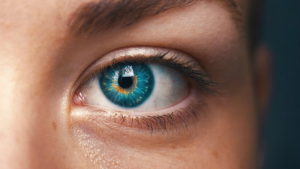
The HIPAA-compliant Patientory App, which already possesses strict security requirements, will use iris-recognition software to add another layer of authorisation on the blockchain. The objective is eliminate healthcare inefficiencies.
“Patient identification is a growing problem in today’s healthcare system,” said Chrissa McFarlane, CEO and founder of Patientory, Inc. “This technology can help providers identify an individual with unparalleled accuracy, through iris-recognition and data matching. And because it’s verified on the blockchain, it’s scalable without sacrificing data security – which is one of the main problems with our current healthcare-data infrastructure.”

Iris-recognition and EyePay
EyePay combines, on a smartphone, IrisGuard’s expertise in iris-recognition technology. It delivers iris comparison in real time. In effect the EyePay brings one biometric – the iris – with IrisGuard’s verifiable identity template. The result is what IrisGuard claims is “a fault-free and guaranteed method of authenticating identity and securing mobile financial transactions with the blink of an eye”.
IrisGuard’s EyePay mobile technology is in use with various United Nations Agencies by:
- UNHCR, for preventing human trafficking by registering refugees and orphans (UNHCR)
- WFP, for providing registration and e-payment solutions to millions of forcibly displaced refugees in the Middle-East.
Because the EyePay Phone is blockchain-ready it can authenticate and authorise patient identification and information in under three seconds. This explains the business logic for linking EyePay into healthcare via Patientory software, which is itself powered by the PTOYNet blockchain.
The potential significance arrives when, according to statistics cited by Pew Research Center, one realises that up to 20% of patient records do not match accurately even within the same healthcare system. The consequences include:
- increased costs
- inefficiency
- risks to patient safety.
As Imad Malhas, CEO IrisGuard U.K., comments: “The innovative iris enabled EyePay Phone significantly improves patient privacy and confidence when sharing their online Electronic Medical Records (EMR) with healthcare stakeholders i.e. (physicians, hospitals, insurance companies, pharmacies and government etc.). The EyePay Phone and PTOYNet proactively enhances patient’s peace of mind knowing that healthcare providers are deploying the most accurate biometric/blockchain identification technology available today in an effort to ensure efficiencies of scale, privacy and trust in the healthcare authentication and authorization processes. This is particularly important given that one out of three Americans had their health care data stolen or hacked recently.”

Patientory
Patientory is a HIPAA-compliant, cybersecurity healthcare data solution. It enables users to securely store, transfer and receive actionable insights into their health information. In addition, its enterprise healthcare software:
- aggregates data
- provides population health management solutions for the health industry.
Patientory incorporates a dApp stack. It integrates with the PTOYNet blockchain network to secure online medical information across platforms. Its app is available on iOS, Android, and on desktop browsers.
Enterprise Times: what does this mean
Iris recognition is one of several technologies which may reduce the amount of fraud and abuse occurring within the pharmaceutical and insurance (and, potentially other) industries. By ensuring patients are who they say they are, and coupled with a blockchain network, immediate and accurate data management should become possible. This includes keeping data and logs about the data for:
- patient histories
- prescriptions
- transactions.
If delivered as Patientory envisages, the iris-recognition accuracy impact will see greater efficiencies as well as streamlined healthcare processes. Patientory, plans to roll out the iris-recognition/blockchain technology in pharmaceutical clinical trials later this year.
























